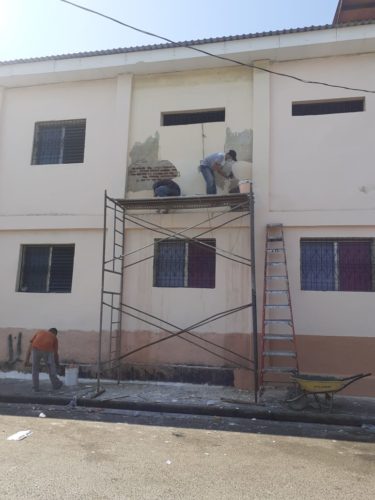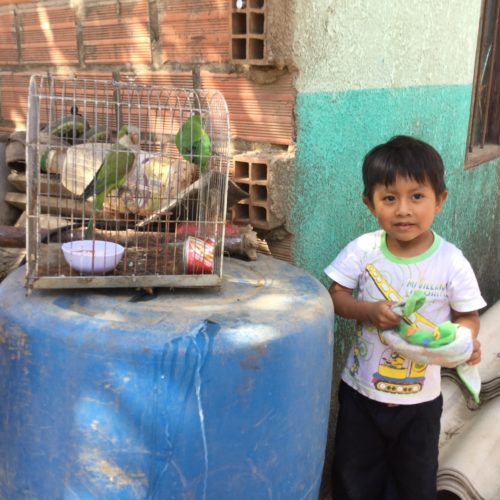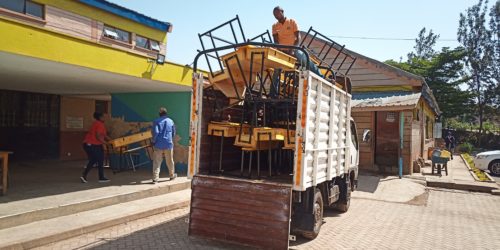Over the years, our supporters have heard numerous accounts of families we work with needing emergency support when natural disasters strike. From flooding to earthquakes to hurricanes to volcanic eruptions, those living in impoverished areas of the world are more affected in negative ways than those not living in poverty.
“When families are living in old houses or in areas that are not protected from natural disasters, many types of hazards can increase their risk of damaged property or harm to themselves.”
“At its most basic level, poverty increases vulnerably,” says Children Incorporated’s Director of Development, Shelley Callahan.
“When families are living in old houses or in areas that are not protected from natural disasters, many types of hazards can increase their risk of damaged property or harm to themselves.”
“Additionally, when families are suffering from poverty, they might not have a lot of insurance to cover damage to their homes or property — because they often have to make hard decisions about how to spend their meager incomes. In other instances, countries don’t offer insurance at all so families that lose their homes can be completely devastated and without support other than the local community and from organizations like Children Incorporated,” explains Callahan.
“It is our goal to help families who are suffering during or after a natural disaster so they may recover more quickly — each and every day without being able to go work because you are trying to clean water damage in your home or clean up after a storm creates more problems for low-income familes. Furthermore, the expenses associated with recovery are usually enormous, and something many families can’t afford.”
“We are endlessly thankful for donations to our Hope In Action Fund which allows us to directly respond to the immediate needs of families after a natural disaster,” states Callahan.
Below, you can read more stories of how donations have helped families during emergencies in the past few years — something we could not do without you!
Hope After Haiyan
The Philippines comprise a vast island nation in Southeast Asia. This archipelago of more than 7,000 islands boasts sandy beaches, towering mountains and volcanoes, tropical rainforests, and an incredible wealth of natural resources and biodiversity. Humans have called these islands home for thousands of years, predating historic records.
Today, the Philippines incorporate a staggering number of languages, ethnic groups, religions, and cultures. Despite its status as an emerging market, however, nearly half of all Filipinos still earn less than $2 a day. Adequate sanitation and access to healthcare and potable water are still daily challenges in this widely underdeveloped country, which is also prone to typhoons, earthquakes, and volcanic activity. The large port city of Tacloban, where the Visayans Community Center at Bliss is located, is no exception to these maladies.
Sending Relief After Flash Floods
Wayne County lies nestled amid the vast natural beauty of the Allegheny Mountains, which still conceal deposits of the coal that once made this a rich and populous area of the Mountaineer State. Automation of mines and the ecological stigmas attached to coal as a fuel source have seriously damaged Wayne County’s economy. With coal  mining almost shut down, all businesses that once depended on mining – and the buying power of the miners — have closed. Unemployment continues to rise, and industry development remains at a crawl.
mining almost shut down, all businesses that once depended on mining – and the buying power of the miners — have closed. Unemployment continues to rise, and industry development remains at a crawl.
When flash floods hit West Virginia a few years ago, none of the families of our sponsored and unsponsored children could have prepared for what was going to happen.
Like many small towns in this rural part of West Virginia, Dunlow is remote, located far from any sizeable town or city. A few strip mines still produce coal, and there are some sawmills that cut lumber. Overall, however, Dunlow’s economy is struggling, with high unemployment and a lack of industry development. Many residents in this region live well below the poverty line, plagued by all the socioeconomic struggles that accompany poverty. One of our affiliated schools in the area, Dunlow Elementary School, offers a place where children can count on support, encouragement, and a nutritious warm meal not only every day, but also in cases of emergency, such as flash flooding — thanks to the help they received from our Hope In Action Fund.
As soon as we heard news of the volcanic eruption, Children Incorporated asked our amazing supporters to donate emergency relief funds that we could send directly to Sagrada Familia.
Emergency Relief After a Volcanic Eruption
In early June, the eruption of the Volcano of Fire near Antigua, Guatemala caught residents living nearby by surprise. By the time the eruption was over, more than one million people had been affected; approximately 3,000 people had been displaced from their homes, and about 250 people were missing. The eruption caused direct damage to five villages in the area surrounding the volcano, including the town of Antigua, where our affiliated project Sagrada Familia is located. The aftermath of the eruption engulfed the neighboring towns not only in thick smoke, but also in heavy ash and hot gases. In addition, huge rocks tumbled down the volcano, blocking roads and destroying homes along their paths.
The Coordinadora Nacional para la Reducción de Desastres (CONRED), a Guatemalan government agency for disaster reduction, quickly set up fifteen shelters after the catastrophe to help displaced residents who were in need of food, cleaning supplies, hygiene items, and bedding during this time of crisis. As soon as we heard news of the volcanic eruption, Children Incorporated asked our amazing supporters to donate emergency relief funds that we could send directly to Sagrada Familia, where our volunteer coordinators were working hard to provide daily support for families who had lost their homes and were living in shelters.
***
How do I sponsor a child with Children Incorporated?
You can sponsor a child in one of three ways: call our office at 1-800-538-5381 and speak with one of our staff members; email us at sponsorship@children-inc.org; or go online to our sponsorship portal, create an account, and search for a child that is available for sponsorship.



 a bold new chapter in its 50-year evolution with the testing and introduction of a new master brand name, “Banter™ by Piercing Pagoda®.” This new name reflects the personal relationship the retailer has with both its new and long-held customers, its innovative customer experiences, and its omnichannel growth strategy. “
a bold new chapter in its 50-year evolution with the testing and introduction of a new master brand name, “Banter™ by Piercing Pagoda®.” This new name reflects the personal relationship the retailer has with both its new and long-held customers, its innovative customer experiences, and its omnichannel growth strategy. “